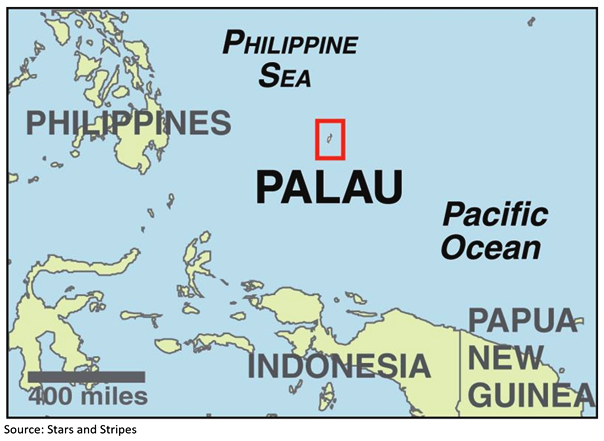Coast guard diplomacy and maritime security in Southeast Asia

The United States’ choice to build up the United States Coast Guard in Southeast Asia is an opportunity for the region to cooperate more closely on maritime security, Aristyo Rizka Darmawan writes.
In its newly released Indo-Pacific Strategy, the United States has placed its Coast Guard in the centre of its maritime security strategy in the Indo-Pacific.
The Strategy says that the country would expand the presence and cooperation of the United States Coast Guard in Southeast and South Asia and the Pacific Islands, with a focus on advising, training, deployment, and capacity building. So, how can Southeast Asian coastguards benefit from this? And how must current regional coast guard arrangements change to respond to the United States’ strategy?
Last year, the Indonesian Sea and Coast Guard and United States Coast Guard jointly created a maritime training centre in Batam, which aims to increase the capacity and capability of the Indonesian Maritime Security Agency (BAKAMLA).
With more American commitment in the region, this kind of cooperation can be expanded – not only with BAKAMLA, but also with other coast guards across Southeast Asia.
Rather than doubling down on its military presence, the United States’ choice to build up its coast guard in the region is probably better for Southeast Asian maritime security.
While there might be some positive impacts stemming from the United States’ current military presence, increasing this yet again poses the risk of provoking China and increasing tension in the South China Sea. The choice to use the coast guard instead signals to the region that the United States is primarily focused on law enforcement activities and technical support.
In addition, a larger navy presence would not substantially help with the region’s maritime law enforcement. Southeast Asia should be ultimately responsible for its own maritime security, but with American technical support. An increased role for the coast guard in the region can boost cooperation and help achieve this goal.
For instance, last year BAKAMLA initiated the very first ASEAN Coast Guard Forum (ACGF), with the same goal – to boost cooperation among Southeast Asian coast guards. The Chief of BAKAMLA said that the ACGF can be a space for information sharing and confidence-building, especially when it comes to the South China Sea.
There have been similar developments within the larger Asian region, including China, with the Head of Asian Coast Guard Agencies Meeting (HACGAM) taking place in December last year.
Of course, a United States Coast Guard presence in the region is not new, but in this context an increasing commitment to coast guard presence could positively impact region’s maritime security, specifically in the South China Sea.
Ideally, the ACGF would not only expand its cooperation with the United States, but also with China, to maintain the centrality of ASEAN nations to the region’s maritime security.
Unfortunately, this is easier said than done. In the last few years, China’s coast guard has acted assertively in the South China Sea, to the disapproval of Southeast Asian nations. This has created trust issues among parties that have hamstrung cooperation.
That said, it may be worth the ACGF exploring cooperation with China on less tense issues, such as natural disaster management.
O verall, an increase in cooperation between coast guards in the region will have a positive impact on its maritime security. Hopefully, the ACGF can take advantage of this move, and position coast guards as a leading space for cooperation on regional maritime security into the future.
verall, an increase in cooperation between coast guards in the region will have a positive impact on its maritime security. Hopefully, the ACGF can take advantage of this move, and position coast guards as a leading space for cooperation on regional maritime security into the future.
*Aristyo Rizka Darmawan is a lecturer and senior researcher at the Center for Sustainable Ocean Policy at the University of Indonesia’s Faculty of Law, where his research focuses on maritime security in Asia and the Pacific.
This piece was first published at Policy Forum, Asia and the Pacific’s platform for public policy analysis and opinion. Read the original here: https://www.policyforum.net/coast-guard-diplomacy-and-maritime-security-in-southeast-asia/
-
Book Shelf
-
 Book Review
DESTINY OF A DYSFUNCTIONAL NUCLEAR STATE
Book Review
DESTINY OF A DYSFUNCTIONAL NUCLEAR STATE
- Book ReviewChina FO Presser Where is the fountainhead of jihad?
- Book ReviewNews Pak Syndrome bedevils Indo-Bangla ties
- Book Review Understanding Vedic Equality….: Book Review
- Book Review Buddhism Made Easy: Book Review
- Book ReviewNews Elegant Summary Of Krishnamurti’s teachings
- Book Review Review: Perspectives: The Timeless Way of Wisdom
- Book ReviewNews Rituals too a world of Rhythm
- Book Review Marx After Marxism
- Book Review John Updike’s Terrorist – a review
-
-
Recent Top Post
-
 CommentariesTop Story
Will Japan Join The Five Eyes Spy Network
CommentariesTop Story
Will Japan Join The Five Eyes Spy Network
- Commentaries Record Pentagon spending bill and America’s hidden nuclear rearmament
-
 NewsTop Story
Taliban Suffers Devastating Blow With Killing Of Minister
NewsTop Story
Taliban Suffers Devastating Blow With Killing Of Minister
-
 China NewsCommentaries
Reality Shadow over Sino-American ties
China NewsCommentaries
Reality Shadow over Sino-American ties
-
 CommentariesNews
Ides of trade between India and Pakistan
CommentariesNews
Ides of trade between India and Pakistan
-
 Commentaries
How sustainable is the rhetoric of India-China Bhai-Bhai
Commentaries
How sustainable is the rhetoric of India-China Bhai-Bhai
-
 Commentaries
New Set of Diplomatic Strains with Canada
Commentaries
New Set of Diplomatic Strains with Canada
-
 News
Ratan Tata’s Legacy
News
Ratan Tata’s Legacy
-
 Commentaries
India’s Strategic Push on the World Stage
Commentaries
India’s Strategic Push on the World Stage
- Commentaries Veils of Resistance
-
AdSense code


















